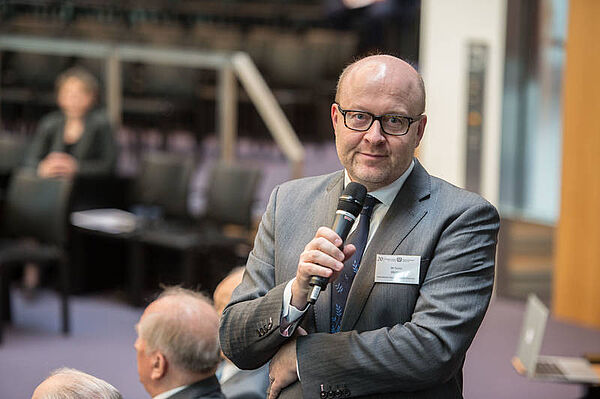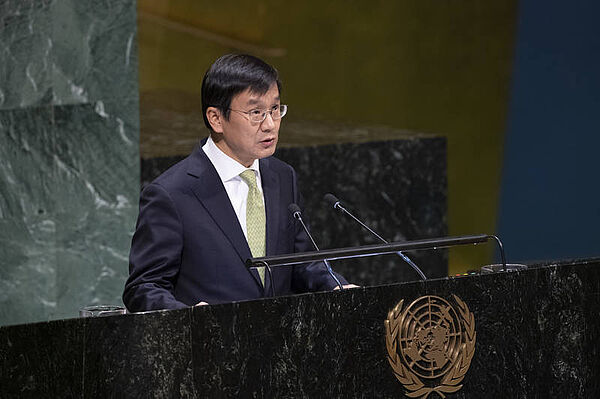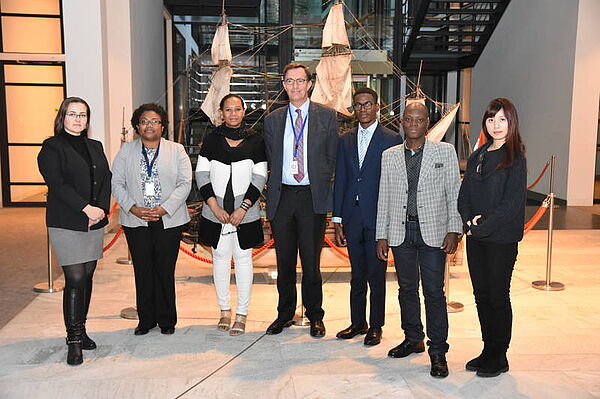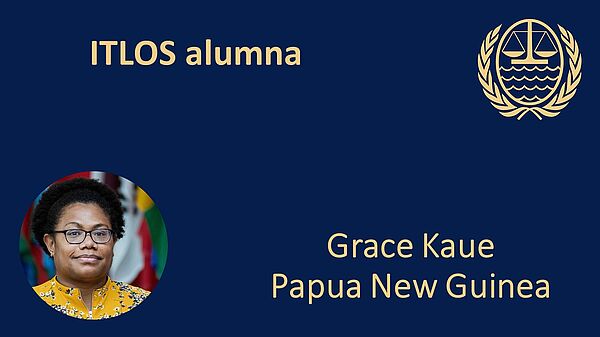Newsletter 2019/1
February 2019
Introduction
Over the last three months, the Tribunal has been dealing with The M/V "Norstar" Case (Panama v. Italy). At the same time, outreach activities to promote the work of the Tribunal are ongoing and a number of conferences, lectures and capacity-building activities in which several Judges and Registry officials and I have participated have been organized.
In November, I had the pleasure to attend the 2018 International Conference on the Law of the Sea, organized by the Korean Society of International Law and the Ministry of Foreign Affairs of the Republic of Korea. This conference was devoted to the role of the Tribunal in the development of the law of the sea. In my keynote statement at the conference, I underlined the importance of strengthening the rule of law in international relations, identifying three basic, inherently inter-related and mutually reinforcing elements: first, a well-developed body of laws; second, a well-developed body of institutions to apply such laws in a fair and coherent manner; and third, a positive attitude of the international community towards the rule of law. I believe that the Tribunal is one of the most important actors in promoting and strengthening the rule of law in the world’s oceans, peacefully settling maritime disputes by interpreting and applying the Convention. Through its capacity-building programmes and outreach activities, the Tribunal helps develop capacity for the law of the sea and the peaceful settlement of disputes, in particular in developing countries, and promotes a positive attitude towards the rule of law.
The importance of the Tribunal’s work was confirmed by the adoption, on 11 December 2018, of United Nations Resolution 73/124 on “Oceans and the Law of the Sea”, which “[N]otes with satisfaction the continued and significant contribution of the Tribunal to the settlement of disputes by peaceful means in accordance with Part XV of the Convention, and underlines the important role and authority of the Tribunal concerning the interpretation or application of the Convention and the Part XI Agreement”. On the day of the adoption of the Resolution, I had the pleasure to address the General Assembly and to report on the Tribunal’s work. From the statements given by States on this occasion, it is evident that the oceans and their resources are growing in priority for all States. On 13 December 2018, the Tribunal held a “Briefing on the settlement of disputes by ITLOS”, organized in conjunction with the Division for Oceans Affairs and the Law of the Sea at United Nations Headquarters. The briefing provided us with an excellent opportunity for dialogue with the representatives of the Permanent Missions.
Coming back to Hamburg, two new films have been produced and are now available on the website: in the first, the Registrar looks at the Tribunal’s potential to assist States facing fisheries-related disputes. The interview looks at the cases already covered by the Tribunal, the legal grounds for instituting proceedings and the course of action for a State faced with an urgent risk of damage to fish stocks. In the second interview, I look at the Tribunal’s potential for assisting the shipping industry when faced with a situation of arrest or a claim for damages or compensation. The Tribunal is frequently faced with shipping disputes and can provide swift assistance in securing the release of a vessel and the crew under certain conditions. It can also award the flag State and private actors involved in shipping compensation for injuries they suffer. It is important to remember that, with 168 States Parties, the Convention offers a mechanism of near global legal protection for the shipping industry in cases of arrest or claims for damages or compensation.I hope that you enjoy reading the newsletter.
With my warmest regards,
Jin-Hyun Paik
President
Interview with the President of the Chamber for Fisheries Disputes, Judge Tomas Heidar

You became a Judge at the Tribunal in 2014 after having served for almost twenty years as the Legal Adviser at the Foreign Ministry of Iceland. How do you compare these roles?
These two roles are fundamentally different but there is one common feature, namely the focus on the law of the sea. As Legal Adviser at the Foreign Ministry of an island State in the middle of the Atlantic Ocean, it goes without saying that a considerable part of the work lies within the field of the law of the sea, including fisheries, the continental shelf and maritime delimitation. In this role, you naturally, first and foremost, seek to protect your country’s interests and promote its views internationally, although common global interests are also pursued. I feel very proud to have represented Iceland and I enjoyed in particular negotiating oceans issues with neighbouring countries and at the United Nations. I probably felt the biggest satisfaction when I was able to participate in settling disputes with other countries.
I have benefited from this experience as Judge at the Tribunal. In that role, however, the task is to weigh the arguments of parties to a dispute and make an objective assessment and decision. This role suits my character very well. The judicial work is very challenging and it carries great responsibility but it has given me immense satisfaction. I feel both privileged and honoured to serve in such a distinguished body as ITLOS.
You have served as President of the Chamber for Fisheries Disputes since October 2017. What is the relevance of the Chamber?
As a general rule, disputes are dealt with by the full Tribunal. However, the Law of the Sea Convention established a Seabed Disputes Chamber and furthermore authorized the Tribunal to form such chambers as it considers necessary for dealing with particular categories of disputes. On this basis, the Tribunal has established four special chambers: the Chamber of Summary Procedure; the Chamber for Fisheries Disputes; the Chamber for Marine Environment Disputes; and the Chamber for Maritime Delimitation Disputes. In my view, this decision was forward-looking as we live in a world that is becoming ever more complex, technical and specialized.
The Chamber for Fisheries Disputes, which consists of nine members, is available to deal with disputes concerning the conservation and management of living marine resources which parties may agree to submit to it. A considerable number of disputes between States in the field of the law of the sea relate to fisheries and therefore it is in my view appropriate to provide for a specialized chamber which is available to deal with such disputes in an efficient manner.
The compulsory mechanism for the settlement of fisheries disputes under the Law of the Sea Convention is quite complicated because of the limitations on its applicability set out in article 297, paragraph 3, of the Convention with respect to disputes relating to the sovereign rights of the coastal State within its exclusive economic zone. Fisheries disputes are also becoming increasingly scientific and complicated as a result of environmental changes.
The ITLOS Advisory Opinion of 2015 at the request of the Sub-Regional Fisheries Commission, addressing illegal, unreported and unregulated fishing (IUU fishing), is particularly relevant. The main focus of the Advisory Opinion is on the obligations, responsibility and liability of flag States in this respect. In my view, the Opinion serves as a guide for coastal States in assessing whether a flag State has fulfilled its obligations with respect to its fishing vessels in a particular case and accordingly whether there is a basis for taking measures, including legal action, against that State.
I believe the existence of the Chamber for Fisheries Disputes and the other specialized chambers has the further advantage of ensuring continuing focus and maintaining expertise within the Tribunal in these areas. The Tribunal holds two administrative sessions each year where the chambers study and take note of developments in their respective areas.
You are also Chairman of the Tribunal’s Committee on Public Relations. What is the role of the Committee?
The Committee oversees work regarding public relations and makes recommendations to the Tribunal in this field. It is important to promote awareness among States of the different procedures for the settlement of disputes by the Tribunal. For this purpose, capacity-building programmes are offered at the Tribunal: the ITLOS-Nippon capacity-building and training programme, the internship programme and the International Foundation for the Law of the Sea Summer Academy, all of which are specially funded. Furthermore, the Tribunal regularly organizes regional workshops in developing countries.
In my view, it is imperative to promote the Tribunal and point out its advantages. ITLOS is the only specialized law of the sea court in the world and it is both time-efficient and cost-effective as States Parties to the Law of the Sea Convention do not have to pay any court fees.
What is your view of Hamburg and the facilities at the Tribunal?
The Tribunal is beautifully located by the Elbe on the outskirts of Hamburg and offers excellent facilities for the Judges, the staff of the Tribunal and for counsel of parties to cases. I have found that those engaged in challenging work on cases before the Tribunal can appreciate the inspiring environment it has to offer.
At a personal level, I enjoy my time in Hamburg very much. I am Icelandic and I am honoured to have been proposed as a candidate by Iceland and the other Nordic countries, but I also have a German background, my mother being German. I speak German fluently and I am happy to have the opportunity to reconnect with my German roots.
ITLOS conferences and events

President Paik gave his annual statement before the United Nations General Assembly on Agenda item 78(a) “Oceans and the Law of the Sea”, on 11 December 2018. The statement is available here.
A “Briefing on the settlement of disputes by ITLOS” was held at United Nations Headquarters for representatives of the Permanent Missions on 13 December 2018. After words of welcome from the Director of the Division for Ocean Affairs and the Law of the Sea (DOALOS), Ms Gabriele Goettsche-Wanli, the President spoke on “The experience of the Tribunal in dealing with law of the sea disputes” and the Registrar presented the topic “Institution of proceedings and conduct of a case”. Information on applications for financial assistance from the ITLOS trust fund for expenses incurred in connection with cases before the Tribunal was provided by Ms Amanda Stoltz, Associate Legal Officer, DOALOS. The briefing was attended by approximately 60 representatives.
ITLOS at conferences
President Paik gave the keynote speech on the “Rule of law in the world's oceans and the role of ITLOS” at the opening of the international conference on the law of the sea organized by the Korean Society of International Law and the Ministry of Foreign Affairs of the Republic of Korea in Seoul on 14-15 December 2018. During the conference, the Registrar gave a talk entitled “An overview of ITLOS: organization, procedure and role in the dispute-settlement mechanism under UNCLOS”, and Judge Hoffmann spoke on the “Advisory function of ITLOS in deep seabed mining and fishing activities”. Judge Kittichaisaree presided over a panel on “Landmark cases of ITLOS and other dispute-settlement bodies under UNCLOS and its effect on maritime order”, while Judge Cabello presided over the panel on “Ways forward for ITLOS in developing the law of the sea”, which included a presentation by Judge Jesus on “The role of ITLOS in addressing new challenges for the legal order of seas and oceans”.
On 18 January 2019, at the invitation of Professor Georg Nolte, Chair of Public Law, International Law and European Law at the Institute for International and European Law at Humboldt University, Berlin, President Paik gave a well-attended lecture on “The rule of law at sea and the role of ITLOS” for researchers and students at the Wengler Library of Humboldt University.
Following on from his participation in the FAO-IMLI International Fisheries Law Training Course last year, the Registrar continued his cooperation with the Food and Agricultural Organization’s capacity-building programmes, giving a lecture on “UNCLOS and dispute-settlement mechanisms in fishing matters”, this time in Vigo, as part of the Port State Measures Inspector Training Course organized by the FAO in partnership with the Port de Vigo, the MarinnLeg Foundation, Xunta de Galicia, Secretaria General de Pesca and the European Commission, on 3 December 2018.
Capacity building

ITLOS-Nippon capacity-building and training programme on dispute settlement under UNCLOS
The nine-month fellowship programme is drawing to a close for the six fellows currently at the Tribunal. November and December saw the fellows attend lectures on topics such as vessel pollution cases brought before national and international tribunals, maritime delimitation, and marine environment protection. The fellows also followed a week-long training course on international environmental law. Experts from the International Seabed Authority, the Commission on the Limits of the Continental Shelf, the Food and Agricultural Organization of the United Nations and the Intergovernmental Oceanographic Commission addressed the fellows, who also attended courses on conflict resolution and negotiation at the Max Planck Foundation for International Peace and the Rule of Law in Heidelberg, and on international procedural law at the Max Planck Institute Luxembourg for International, European and Regulatory Procedural Law.
The fellows will complete their research papers in the coming weeks and present them to the Judges in the upcoming administrative session.
Internship programme
The three Legal Office interns, Arnold Egon (Cameroon), Kristina Gurova (Bulgaria) and Yunjin Kim (Republic of Korea), who were with us until December, completed their internships with presentations on “Les tribunaux arbitraux constitués en vertu de l'Annexe VI de la Convention des Nations Unies sur le droit de la mer”, “The legal framework of marine protected areas under UNCLOS: the high seas of the Arctic Ocean” and “The legal regime applicable to the exploration and exploitation of marine genetic resources in areas beyond national jurisdiction”. Our three new interns, Jean Raoul Meles Esmel (Côte d’Ivoire), Xiangzin (Lily) Xu (China) and Sebastián Preller Borquez (Chile) are just starting their work with the Legal Office.
As is to be expected, the Tribunal receives many applications for internships with the Legal Office each month. Perhaps somewhat less well-known is the possibility to serve an internship with the Library, Press Office or Linguistic Services. If you are studying library science or information management, translation or interpretation, or public relations, communications or journalism, please do consider applying for the programme. Relevant information, the funding available for nationals of developing countries, and the application form are available on our website Training pages.
ITLOS alumni network
With over 400 members, the ITLOS alumni network is going from strength to strength. The Tribunal endeavours to maintain contact with as many of them as possible, keeping them up to date about conferences in which alumni participate, their publications, and reunions around the world. A new development in the last three months has seen the establishment of a series of ITLOS alumni presentations, which enable former interns and fellows to present their research or tasks on which they are working to the current group of interns and fellows. Alumni are invited to return to the Tribunal or to give an online presentation. Presentations have so far been given on “Administered contractors for hydrocarbon extraction in Brazil”, by Cintia Nunes, intern in 2017 and PhD Candidate at the Erasmus University Rotterdam, and on “UNCLOS: the international duty to cooperate and cetaceans” by Rob Steenkamp, intern in 2016 and PhD Candidate at the University of Hamburg. We look forward to welcoming other alumni back to the Tribunal in the future.
International Foundation for the Law of the Sea 2019 Summer Academy
The 13th IFLOS Summer Academy, on “'Promoting ocean governance and the peaceful settlement of disputes”, will be held at the Tribunal from 21 July to 16 August 2019. Information about the programme and the application procedure is now available on the IFLOS website.
Meet ITLOS alumni

Ms Grace Kaue, Nippon fellow in 2018/2019, Principal Legal Officer (Oceans Project Secretariat), Office of the State Solicitor, Department of Justice and Attorney General, Papua New Guinea
Back in 2015, the Papua New Guinea (PNG) Government decided, inter alia, to establish an Office of Ocean Affairs to implement the country’s Maritime Zones Act 2017 (MZA). Part of this work also included establishing a national oceans policy, to guide the implementation of a zone-based management and governance framework based on UNCLOS. PNG’s maritime space is three times bigger than its land area but less developed in specific zones in terms of policy and regulations.
The MZA covers all aspects of ocean use and the rights and responsibilities of different government agencies, introduces rights of navigation and transit passage, rights to exploit the natural resources of both the sea and the continental shelf, protection of the marine environment, and conduct of marine scientific research, etc. The zone-based management scheme established under the MZA, however, is currently fragmented and in need of coordination. I joined the Oceans Project Secretariat, within the Department of Justice and Attorney General, to assist in the task of coordinating representatives of the maritime boundary team, shipping, fisheries and mining industries, seeking the input of the many stakeholders at national, regional and provincial level, and aiming to create a policy framework bringing all sectors together. I applied for the Tribunal’s fellowship programme in spring 2018 in the hope that I would attend an intensive programme of lectures covering a broad range of topics relating to the uses of the oceans. I planned to return home at the end of the programme with a deeper knowledge of the Convention, an understanding of the current issues facing the oceans, and a suitcase full of legal tools to apply in the development of an ocean policy. I have not been disappointed.
There are a number of capacity-building programmes available for those working in this field. Many involve a course of lectures, most include a period of research. But this fellowship is unique. What sets it apart from the others is that the programme is not just about research, it’s about face-to-face experiences, meeting the people working with, developing and implementing the law of the sea. Via well-structured modules of lectures, fellows benefit from unprecedented interaction with the Tribunal’s Judges, with academics and practitioners and with counsel from cases dealt with under UNCLOS. We learn about the drafting history and establishment of UNCLOS, its development over the years and its implementation today.
I can follow the Commission on the Limits of the Continental Shelf or read about the work done by the FAO in relation to IUU fishing or the UNESCO Intergovernmental Oceanographic Commission at home or in a library. With the fellowship programme you get to meet a commissioner of the CLCS, the Chief of the Development Law Service at the FAO, attend a lecture given by them and put your questions directly to them. I can study the European Union’s work on combatting IUU fishing and marine biological diversity of areas beyond national jurisdiction (BBNJ), but in Brussels I get to talk to representatives of the Directorate-General for Maritime Affairs and Fisheries, in London to an IMO Legal Officer, in The Hague to the legal teams at the International Court of Justice and the Permanent Court of Arbitration. It is all about dialogue, visiting specific organizations or meeting their experts in Hamburg, all of which helps us understand the operational aspects of implementing the Convention.
The bedrock of this programme is, of course, the study of the UNCLOS dispute-settlement mechanism, and over the nine months’ duration of the course you gain a deep understanding of the steps to be taken before submitting a dispute to a court or tribunal, with courses and practical training exercises on negotiation, mediation and conciliation. The training programme on dispute-settlement mechanisms offered by the Max Planck Institute Luxembourg for International, European and Regulatory Procedural Law underscores this. I must add that attending a case before the Tribunal was a personal highlight. I relished the chance to see how the procedural, theoretical and practical aspects of a case come together. The supporting lectures showed us how a case is submitted, looked at case management, the preparation of pleadings, legal writing and oral advocacy. Another special moment was the visit to The Hague, which gave us the opportunity to see how the various dispute-settlement bodies available under Part XV of the Convention are actually part of the same system and how they work coherently together.
My research, which looks at the governance and management framework in the Area and the development of standards for a national deep seabed mining framework, has been supervised by the Registrar of the Tribunal. With regular meetings and review of my research work, I have been able to benefit from his expertise and guidance, as well as that of other Registry officials. This is all supported by the vast research materials housed in the Tribunal’s Library, backed up by our visit to the Max Planck Foundation in Heidelberg, and, of course, the lectures in this module, given by Alfonso Ascencio-Herrara (ISA Legal Counsel and Deputy to the Secretary-General), Judge Hoffmann (President of the Seabed Disputes Chamber) and Dr Urs Engels, Senior Policy Advisor and Deputy Head of Division of the Federal Ministry for Economic Affairs and Energy, and also Head of the German delegation to the ISA. This goes together with a visit to the Hannover-based Federal Institute for Geosciences and Natural Resources, which is responsible for the exploration phase of seabed mining for the Government of Germany.
Building networks and making contacts is of paramount importance and the programme has given me incredible opportunities to meet Judges, experts and practitioners and also to build up a network among the Summer Academy participants, my fellow participants on the programme, ITLOS interns and alumni.
How will I use the knowledge gained? My involvement in the development of an ocean governance policy for my country will be challenging. Issues such as seabed mining or IUU fishing require a more coordinated and transparent approach to ensure that all levels - national, provincial and community - benefit from the resources. I hope that when I go back home, this training will have given me a firm basis for contributing better to the making of appropriate recommendations. Having deepened my understanding of the Convention, I return with inspiration for ocean policy work and a whole new set of contacts to call upon for further information.
I can only hope that news about this training programme spreads. Awareness of the Convention, and in particular its dispute-settlement procedure, is of growing importance. I view each fellow returning home from the programme as an ambassador for the Tribunal and its work and also for the oceans. I highly recommend submitting an application; the experience is unique.
Upcoming events
The Judgment in The M/V "Norstar" Case (Panama v. Italy) is expected to be read in April 2019.
The Tribunal will hold its 13th regional workshop in Montevideo, Uruguay on 15-16 May 2019.
The 13th IFLOS Summer Academy, entitled “Promoting ocean governance and the peaceful settlement of disputes”, will be held at the Tribunal from 21 July to 16 August 2019. Information about the programme and the application procedure is now available on the IFLOS website.

